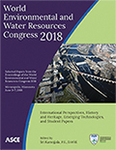World Environmental and Water Resources Congress 2018
Hydropolitics in Water Governance of the Nile River in Africa
Publication: World Environmental and Water Resources Congress 2018: International Perspectives, History and Heritage, Emerging Technologies, and Student Papers
ABSTRACT
The transboundary water issues are usually enshrined in regional and international political arena. In order to have a formative governance and political management, it is desired to have an all-out inclusiveness of various players in various international river basins. However in most of the international river basins, various riparian states find themselves in conflictual situations as they mantle to access and gain control of the fugitive water resources. The Nile River is a unique river system in the African continent which is of utmost importance to the socio-economic development of 11 riparian countries. The pressure for economic development of the basin’s riparian states is fissuring the political landscape on the development and utilization of the Nile waters casting a new era of hydropolitics in the region. This paper discusses the Nile basin hydropolitics currently conspicuously reddened with intrigue and mistrust threatening sustainable development and management of the Nile waters. It highlights the issues and opportunities to better utilize the available resources amicably with minimal conflicts.
Get full access to this article
View all available purchase options and get full access to this chapter.
REFERENCES
“About the International Decade for Action UN ‘Water for Life’ 2005-2015.” (2011). http://www.un.org/waterforlifedecade/background.shtml.
Allan, J. A. (2000) The Middle East Water Question: Hydropolitics and the Global Economy, I. B. Tauris, London
Allan, J. A. (2010) Virtual Water, I. B. Tauris, London Buzan, B (1995) ‘The levels of analysis problem in international relations reconsidered’, in K. Booth and S. Smith (eds)International Relations Theory Today, Polity Press, Cambridge, pp198–216
Arsano, Yacob, and Imeru Tamrat. (2005). “Ethiopia and the Eastern Nile Basin.” Aquatic Sciences67(1): 15–27.
Belay, Alebel Abebe, Henry Musoke Semakula, George James Wambura, and Labohy Jan. 2010. “SWOT Analysis and Challenges of Nile Basin Initiative: An Integrated Water Resource Management Perspective.” Chinese Journal of Population Resources and Environment8(1): 8–17.
Boisson de Chazournes, Laurence. 2009. “Freshwater and International Law : The Interplay between Universal, The United Nations World Water Development Report 3.”
Collins, Robert O (2002). “The Nile. New Haven, CT”: Yale University Press.
Earle, Anton, Anders Jägerskog, and Joakim Öjendal. 2010. Transboundary Water Management. Principles and Practice.
Hultin, J.(1995). The Nile: Source of Life, Source of Conflict. In Ohlsson, L. (Ed.) 1995. Hydropolitics: Conflicts over Water as a Development Constraint. London: Zed Books
Hurst, HE, P Phillips, RP Black, and YM Simaika. 1931. “The Nile Basin.” http://library.wur.nl/WebQuery/clc/915661.
Liersch, Stefan, Hagen Koch, and Fred Fokko Hattermann. 2017. “Management Scenarios of the Grand Ethiopian Renaissance Dam and Their Impacts under Recent and Future Climates.” Water (Switzerland)9(10): 1–24.
Long, Y. (2002) ‘On the threshold of self-sufficiency: towards the desecuritization of the water issue in Singapore–Malaysia relations’, in C. G. Kwa (ed.)Beyond Vulnerability? Water in Singapore–Malaysia Relations.
Lumumba, Patrick Loch Otieno. 2011. “The Interpretations of the 1929 Treaty and Its Legal Relevance to and Implications for the Stability of the Region.” Cooperative diplomacy, regional stability and national interests: the Nile River and riparian states:3–22.
McCaffrey, S. (2003). “The Need for Flexibility in Freshwater Treaties”, Natural Resources Forum, Vol. 27, pp. 156–162.
Nile Basin Initiative. 2012. State of the River Nile Basin 2012.
Nile Basin Initiative. 2016. “The Socio-Economic Profiles Of The Nile Basin Countries.” The Nile Basin Water Resources AtlasCHAPTER 3.
Pahl-Wostl, C. (2007). “Transitions Towards Adaptive Management of Water Facing Climate and Global Change,” Water Resource Management, Vol. 21, pp. 49–62.
M.A. Salman. (2017). “The Nile Basin Cooperative Framework Agreement: The impasse is breakable”!http://www.sudantribune.com/spip.php?article62804
Sanchez, Juan Carlos, and Joshua Roberts. 2014. Transboundary Water Governance Adaptation to Climate Change Transboundary Water Governance Adaptation to Climate Change. https://portals.iucn.org/library/node/44675.
Scott, Barrett. 1994. “Conflict and Cooperation in Managing International Water Resources.” (May 1994): 1–44.
Teclaff, L.A. (1996). “Evolution of the River Basin Concept in National and International Water Law,” Natural Resources Journal, Vol. 36, pp. 359–391, at p. 387.
Timmerman, J.G, and Langaas, S. (2005). “Water Information: What is it Good for? The Use of Information in Transboundary Water Management,” Regional Environmental Change, Vol. 5(4), pp. 177–187, at p. 181.
United Nations Development Programme. (2016). Human Development Report 2016. http://hdr.undp.org/sites/default/files/2016_human_development_report.pdfx.
United Nations Development Programme.(2006). 28 Journal of Government Information Human Development Report 2006 - Beyond Scarcity: Power, Poverty and the Global Water Crisis. http://hdr.undp.org/en/media/HDR06-complete.pdf.
World Bank, (2003b). Nile Basin Initiative, Shared Vision Program (SVP) Project-African Region–Project Appraisal Document. InfoShop-World Bank (Vol. 1, Report no. 26222), 170.
World Bank, (2017). “GDP per Capita, PPP (Current International $) | Data.” http://data.worldbank.org/indicator/NY.GDP.PCAP.PP.CD?order.
World Bank, (2017) “Sustainable Energy for All (SE4ALL) database”. https://data.worldbank.org/indicator/EG.ELC.ACCS.UR.ZS
Wouters, P. et al. (2005). “Sharing Transboundary Waters—an Integrated Assessment of Equitable Entitlement: The Legal Assessment Model,’ Technical Documents in Hydrology No. 74, pp. 20 and 22. International Hydrological Programme (IHP) of the United Nations Educational, Scientific and Cultural Organization (UNESCO): Paris, France.
Yohannes, Okbazghi. 2009. “Hydro-Politics in the Nile Basin: In Search of Theory beyond Realism and Neo-Liberalism.” Journal of Eastern African Studies3(1): 74–93.
Information & Authors
Information
Published In
World Environmental and Water Resources Congress 2018: International Perspectives, History and Heritage, Emerging Technologies, and Student Papers
Pages: 277 - 290
Editor: Sri Kamojjala, Las Vegas Valley Water District
ISBN (Online): 978-0-7844-8139-4
Copyright
© 2018 American Society of Civil Engineers.
History
Published online: May 31, 2018
Published in print: May 31, 2018
Authors
Metrics & Citations
Metrics
Citations
Download citation
If you have the appropriate software installed, you can download article citation data to the citation manager of your choice. Simply select your manager software from the list below and click Download.
